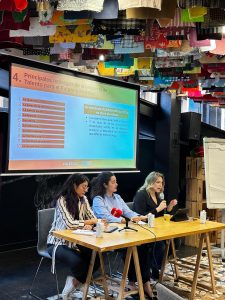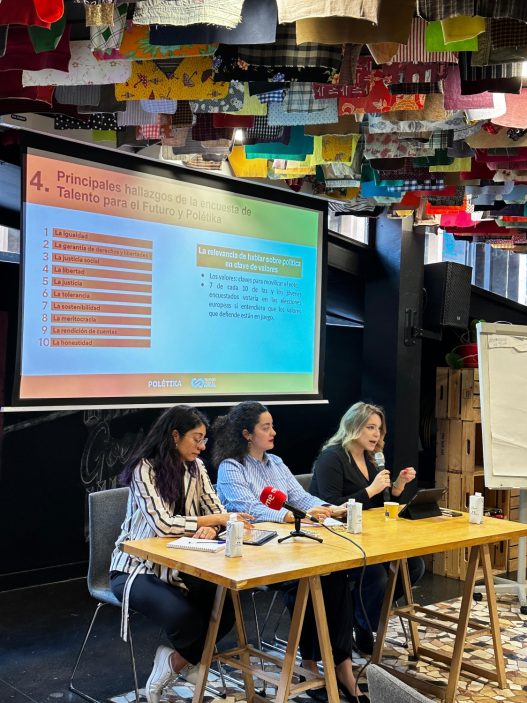
35% OF YOUNG PEOPLE IN SPAIN DO NOT FEEL REPRESENTED BY THE EUROPEAN UNION
By Aquí Europa
Polétika and Talento Para El Futuro have conducted a survey of 1,000 young Spaniards between 18 and 30 years old to know their perception of politics, the European Union (EU) and their intention to participate in the next European Elections.
The young vote is the great desired and at the same time, the great unknown in the electoral processes. To shed light on the relationship between youth and politics, in the context of the upcoming European elections on June 9, Polétika and Talento Para El Futuro have tried to find out what are the values that mobilize the vote in the age segment between 18 and 30 years through a national survey under the title “Between love and ghosting: Spanish youth in front of Europe”, just the day before the celebration of Europe Day.
This study has counted with the intervention of Belén Agüero, researcher and representative of Polétika, who has explained the technical details and motivations of the survey carried out by NetQuest; Mireya Diouri Bravo, project manager of the project and Marlene García Cambra, communication director of Talento para el Futuro. They explained the main conclusions of a survey that had a triple objective: to know the perception of politics, the European Union and the participation of Spanish youth.
The results of the research show a high level of political disaffection on the part of young people, with 65% of those surveyed disappointed by political representatives (and of these, men aged 25 to 30 are the most disappointed, with rates exceeding 70%). However, even with this widespread feeling among young people, the survey shows that only 13% say they ‘don’t care’ about what happens in politics.
POLITICS DOES NOT REPRESENT THEM AND THE EU IS FAR AWAY FROM THEM
This disaffection also reaches the European level: although the Spanish youth is still mostly pro-European – 65% believe that the European Union is beneficial for their country and their lives and only 15% would support the exit of Spain -, 35% of young people surveyed say they do not feel “represented by the EU”. In this case, it is the young self-identified conservatives who feel most strongly that the EU represents them (36%).
And although the latest Eurobarometer predicts a high turnout in these upcoming elections, just over 30% of the girls and boys surveyed were aware of the election and also say they will vote. On the positive side, another 33% would consider voting if they had more information about the proposals at stake. Therefore, turning enthusiasm into electoral commitment is clearly a challenge facing young people eligible to vote in Spain.
Approximately the same percentage who say they do not feel represented by the EU claim not to understand well the functioning of the European institutions (a figure that rises to 40%), so we could establish a parallelism between knowledge and engagement. This lack of knowledge is broad and widespread, with no differences between men and women or on the left/right axis.
VOTING INTENTION, AT STAKE FOR “NOT DEFENDING THE VALUES” OF YOUNG PEOPLE
The survey states that “7 out of 10 of the young people surveyed would vote in the European elections if they understood that the values they defend were at stake”. However, 33% of them were unaware of the existence of the June 9 elections and the same percentage – 33% – said they knew about the elections and said they would go to vote.
Another fact that emerges from this study is that 12% of those surveyed declare that they will not go to vote, indicating that “they do not do so because they ignore the influence of the EU in their lives, but because either they are not interested in politics in general (30%), or believe that their vote is not useful (+34%) or because they claim “not to understand politics” (+ 20%) or because they consider that “all politicians are the same” (+18%)”.
This study shows the distance with which Spanish youth perceive the European institutions and invites to reflect on the work that political parties must do so that young people perceive EU policies as their own, something that in Spain is perceived as distant.
————
This article was originally published in Aquí Europa, with whose authorization we reproduce it.



